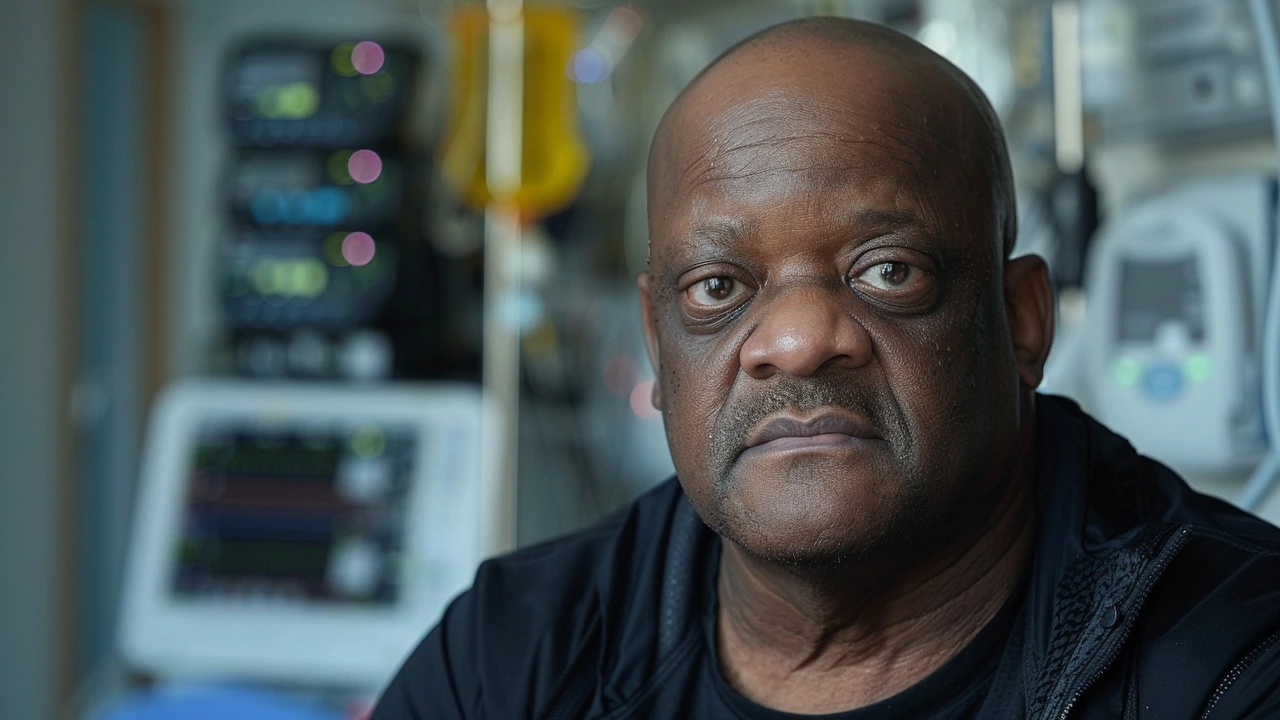In a groundbreaking medical procedure that captivated the global health community, Richard 'Rick' Slayman became the first person to receive a genetically modified pig kidney. This significant medical event aimed to pave new avenues in the field of xenotransplantation, where tissues or organs are transferred between species. Sadly, just two months following this historic operation, Slayman passed away. The team at Massachusetts General Hospital, where the surgery was conducted, confirmed that his death was not directly linked to the transplant. Before undergoing this experimental procedure, Slayman battled with a suite of health challenges, including end-stage kidney disease, Type 2 diabetes, and hypertension, marking a desperate need for medical intervention.
Slayman's initial venture into kidney transplantation occurred in 2018 with a human donor kidney. However, by the time five years had elapsed, that transplant began to fail, presenting a perilous situation for him. Without many viable options left, the decision to proceed with a pig kidney transplant was taken. Remarkably, after the transplant on March 16, it was reported that the organ was functioning well, so much so that Mr. Slayman no longer required dialysis. This development was initially viewed as a sign of potential success in what has been one of the most watched areas of medical science.
Despite this innovative advancement in the medical field, history tells us that xenotransplantation has been laced with both hope and tragic missteps. Prior to Mr. Slayman's procedure, two other patients had received pig heart transplants. Unfortunately, both individuals died shortly after their respective surgeries, underscoring the tremendous risks involved in such pioneering medical work. Nevertheless, the transient success seen in Slayman's case had offered a glimmer of hope, suggesting that with further research and development, the dream of successfully using animal organs for human transplants could become a commonplace reality.
Apart from the medical implications of his procedure, Richard Slayman was remembered fondly by his family as a kind-hearted individual with a sharp sense of humor and a deep commitment to his loved ones. His relatives expressed that his participation in this experimental transplant was spurred by a desire to inspire and to help relieve the dire organ shortage. They hoped his story would serve as a beacon of hope for many suffering from debilitating organ diseases and waiting on long transplant lists. His family's grief at his sudden passing was compounded by the pride they felt in his bravery and altruistic spirit.
Massachusetts General Hospital, where this historic transplant was performed, voiced profound sadness at the news of Slayman's death and extended heartfelt condolences to his bereaved family. In their communications, they reiterated that these types of medical advancements are fraught with uncertainties but are crucial strides toward solving the complex puzzle of organ shortage. As the medical community mourns the loss of a brave soul, the legacy of Rick Slayman is bound to further ignite debates and research in the promising yet challenging area of xenotransplantation. The health implications, ethical considerations, and future of cross-species transplantations will continue to stimulate discussions in the scientific circles, driven by stories like that of Richard Slayman, who showed immense courage on the front lines of medical innovation.






This is so heartbreaking but also so brave. 💔❤️ Rick didn’t just fight for himself-he fought for everyone waiting on that list. His courage is a light in the dark. We’ll keep pushing forward because of people like him.
Life is a cycle. We take from nature, we give back. Maybe this is just nature’s way of teaching us we’re not the center of everything. Pig kidney. Human soul. Same blood. Same pain.
Oh wow. A pig kidney. Next they’ll be giving us pig lungs and cow hearts. At this point, are we even human anymore? Or just a glitch in the meat machine? 😏
RIP Rick. Brave man. This isn’t the end. It’s just the first draft. 🙌
I knew it. This is how the elites start replacing humans with bio-engineered hybrids. They’ve been testing this for decades in secret labs. Why do you think the FDA approved it so fast? They’re already replacing poor people’s organs with pig parts to save money. Wake up. The pigs are watching. And they’re not happy.
I’m crying right now. Not because he died-but because he chose this. He knew the odds. He knew the risks. And still, he said YES. For strangers. For future generations. That’s not just science-that’s pure, unfiltered humanity. If we lose this spirit, we’ve lost everything.
Honestly the whole xenotransplantation thing is overhyped. I mean sure the kidney worked for 2 months but come on we’re talking about a pig here. The immune response is just a bandaid solution. Real solution? Lab grown organs. That’s the future. This was just a flashy PR stunt with a cute piggy mascot
I’ve been thinking a lot about this. The science is one thing. But what’s more powerful is the story. A man who was tired of being sick, tired of waiting, tired of watching his life shrink-chose to bet on something unknown. Not for fame. Not for money. Just to maybe help someone else not feel the same way. That’s the real breakthrough here. Not the organ. The choice.
While the emotional narrative is compelling, one must acknowledge the statistical insignificance of a single-case outcome. The procedure, though technically remarkable, lacks reproducible data to support scalability. One must temper optimism with empirical rigor.
So now we’re okay with swapping human organs for pig parts? What’s next? Dog pancreas? Chicken liver? We’re turning medicine into a zoo. And they call it progress. I call it desperation dressed up as innovation.
I’ve seen this coming for years. The world is falling apart and they’re giving people pig organs instead of fixing the system. Where’s the funding for public healthcare? Where’s the justice for those who can’t even afford dialysis? This isn’t a miracle-it’s a distraction. A rich man’s Band-Aid on a dying planet.
There is a quiet tragedy in being the first. The world watches. The world applauds. The world forgets. And then you’re gone. And the machines keep ticking. And the pigs keep breeding. And the next patient? They’ll never know your name. Only your number.